Culture of Nigeria
| Part of a series on the |
| Culture of Nigeria |
|---|
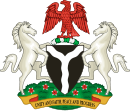 |
| Society |
| Topics |
|
| Symbols |
|
|

The culture of Nigeria is shaped by Nigeria's multiple ethnic groups. The country has 527 languages, seven of which are extinct.[1] Nigeria also has over 1150 dialects and ethnic groups. The three largest ethnic groups are the Hausas that are predominantly in the north, the Yorubas who predominate in the southwest, and the Igbos in the southeast. There are many other ethnic groups with sizeable populations across the different parts of the country. The Kanuri people are located in the northeast part of Nigeria, the Tiv people of north central and the Efik-Ibibio are in the south south. The Bini people are most frequent in the region between Yorubaland and Igboland.
Nigeria's other ethnic groups, sometimes called 'minorities', are found throughout the country but especially in the north and the middle belt. The traditionally nomadic Fulani can be found all over West and Central Africa. The Fulani and the Hausa are predominantly Muslim, while the Igbo are predominantly Christian and so are the Bini and the Efik. The Yoruba are equally likely to be either Christian or Muslim. Indigenous religious practices remain important to all of Nigeria's ethnic groups however, and frequently these beliefs are blended with Christian or Muslim beliefs, a practice known as syncretism.
Major Nigerian ethnic cultures[]



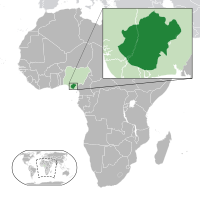


Bini culture[]
The Binis are located in the South South region of modern Nigeria. They are ruled by monarchs, and are famous for their Benin Bronzes. In the pre-colonial period, they controlled a powerful empire.
Hausa-Fulani culture[]
The Hausa and Fulani live in the northern part of Nigeria. They are the most populous ethnic grouping in the country, even though the Hausa and Fulani are in fact different tribes. Like the Efik and Ibibio, they are counted as one here due to the historic ties that have united them politically. They have monarchs, are known for celebrating the Hawan Sallah festival,[2] and are followers of the religious teachings of Sheikh Usman dan Fodio.
Igbo culture[]
The eastern part of Nigeria is the home of the Igbos, who are mostly Christians. Their traditional religion is known as Omenani. Socially, they are led by monarchs who had limited power historically. These figures are expected to confer subordinate titles upon men and women that are highly accomplished. This is known as the Nze na Ozo title system.
Ijaw culture[]
The Ijaw culture of the South South has been influenced greatly by its location on the coast and the interaction with foreigners that it necessitated. Its members amassed great wealth while serving as middlemen, and the preponderance of English names among them today is a testament to the trade names adopted by their ancestors at this time.
Yoruba culture[]
The Yorubas are located in the western region of Nigeria and their leadership is monarchial in nature. Their chiefs are monarchs and titled individuals, with most of the latter group making up the membership of the Ogboni secret society. Their traditional religion, Ifa, has been recognized by UNESCO as a masterpiece of the oral tradition of Humanity.
Nigerian upper class[]
Ever since the country's earliest centralization - under the Nokites at a time contemporaneous to the birth of Jesus Christ - Nigeria has been ruled by a class of titled potentates that are known as chiefs . Led by the Nigerian traditional rulers (i.e. monarchs who have received definite authority from the official government and are recognized by the laws of Nigeria), the chiefs come in various ranks and are of varied kinds - some monarchs are so powerful that they influence political and religious life outside their immediate domains (the Sultan of Sokoto and the Ooni of Ife, for example), while in contrast many local families around the country install their eldest members as titled chiefs in order for them to provide them with what is an essentially titular leadership.
Although chiefs have few official powers today, they are widely respected, and prominent monarchs are often courted to endorse politicians during elections in the hopes of them conferring legitimacy to their campaigns by way of doing so. Successful Nigerians, such as businessmen and the said politicians, typically themselves aspire to the holding of chieftaincies, and the monarchs' control of the honours system that provides them to them serves as an important royal asset.
Nigerian literature[]

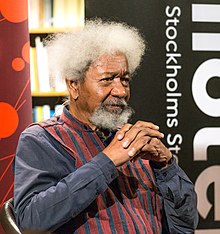
Nigeria is famous for its English language literature. Things Fall Apart, by Chinua Achebe, is an important book in African literature.[3] With over eight million copies sold worldwide, it has been translated into 50 languages, making Achebe the most translated African writer of all time.[4][5]
Nigerian Nobel laureate Wole Soyinka described the work as "the first novel in English which spoke from the interior of the African character, rather than portraying the African as an exotic, as the white man would see him."[6] Nigeria has other notable writers of English language literature. These include Femi Osofisan, whose first published novel, Kolera Kolej, was produced in 1975; Ben Okri, whose first work, The Famished Road, was published in 1991, and Buchi Emecheta, who wrote stories drawn from her personal experiences of gender inequity that promote viewing women through a single prism of the ability to marry and have children. Helon Habila, Sefi Atta , Flora Nwapa, Iquo DianaAbasi Eke,[7] Zaynab Alkali and Chimamanda Ngozi Adichie,[8] among others, are notable Nigerian authors whose works are read widely within and outside the country.[9]
Apart from the speakers of standard English, a large portion of the population, roughly a third, speaks Nigerian pidgin, which has a primarily English lexicon. It has become a common lingua franca as a result. Pidgin English is a creolized form of the language. For instance, "How you dey" means "How are you". The Palm Wine Drinkard, a popular novel by Amos Tutuola, was written in it.
Nollywood[]

Since the 1990s the Nigerian movie industry, sometimes called "Nollywood", has emerged as a fast-growing cultural force all over Africa. Vast wealth has been generated by it, and it is currently the second-largest film industry in the world by output.
Because of the movies, western influences such as music, casual dressing and methods of speaking are to be found all across Nigeria, even in the highly conservative north of the country.[10]
Media[]

Sports[]

The Nigerian national football team, nicknamed the "Super Eagles", is the national team of Nigeria, run by the Nigeria Football Federation (NFF). According to the FIFA World Rankings, Nigeria ranks 31st and holds the second-highest place among the African nations behind Senegal (20th). The highest position Nigeria ever reached on the ranking was 5th, in April 1994.
Supporters of English football clubs like Manchester United, Arsenal, Manchester City, Liverpool and Chelsea often segregate beyond the traditional tribal and even religious divide to share their common cause in Premier League teams.
Architecture[]

Food[]
Nigerian food offers a rich blend of traditionally African carbohydrates such as yam and cassava as well as the vegetable soups with which they are often served. Maize is another crop that is commonly grown in Nigeria.[11] Praised by Nigerians for the strength it gives, garri is "the number one staple carbohydrate food item in Nigeria",[12] a powdered cassava grain that can be readily eaten as a meal and is quite inexpensive. Yams are frequently eaten either fried in oil or pounded to make a mashed potato-like yam pottage. Nigerian beans, quite different from green peas, are widely popular. Meat is also popular and Nigerian suya—a barbecue-like roasted meat—is a well-known delicacy. Bush meat, meat from wild game like antelope and duikers, is also popular. Fermented palm products make a traditional liquor, palm wine, and also fermented cassava. Nigerian foods are spicy, mostly in the western and southern part of the country, even more so than in Indian cuisine. Some more examples of their traditional dishes are eba, pounded yam, iyan, fufu and soups like okra, ogbono and egusi. Fufu is so emblematic of Nigeria that it figures in Chinua Achebe's Things Fall Apart, for example.[13]
Music[]
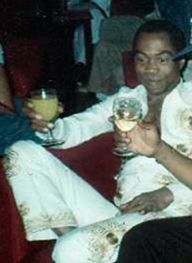

The music of Nigeria includes many kinds of folk and popular music, some of which are known worldwide. The singer and social activist Fela Kuti was instrumental in Nigeria's musical development. His personalized sound, dubbed Afrobeat, is now one of the continent's most widely recognised genres.[citation needed]
Traditional musicians use a number of diverse instruments, such as Gongon drums. The kora and the kakaki are also important.[citation needed]
Other traditional cultural expressions are found in the various masquerades of Nigeria, such as the Eyo masquerades of Lagos, the Ekpe and Ekpo masquerades of the Efik/Ibibio/Annang/Igbo peoples of coastal southeastern Nigeria, and the Northern masquerades of the Bini. The most popular Yoruba manifestations of this custom are the Gelede masquerades.[citation needed]
Clothing[]
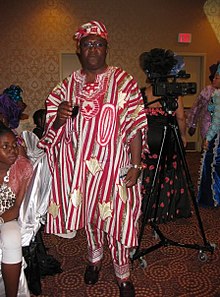
Women wear long flowing robes and headscarves made by local makers who dye and weave the fabric locally. Southern Nigerian women choose to wear western-style clothing. People in urban regions of Nigeria dress in western style, the youth mainly wearing jeans and T-shirts. Other Nigerian men and women typically wear a traditional style called Buba. For men the loose-fitting shirt goes down to halfway down the thigh. For women, the loose-fitting blouse goes down a little below the waist. Other clothing gear includes a gele, which is the woman's headgear. For men their traditional cap is called fila.
Historically, Nigerian fashion incorporated many different types of fabrics. Cotton has been used for over 500 years for fabric-making in Nigeria. Silk (called tsamiya in Hausa, sanyan in Yoruba, and akpa-obubu in Igbo) is also used.[14] Perhaps the most popular fabric used in Nigerian fashion is Dutch wax print, produced in the Netherlands. The import market for this fabric is dominated by the Dutch company Vlisco,[15] which has been selling its Dutch wax print fabric to Nigerians since the late 1800s, when the fabric was sold along the company's oceanic trading route to Indonesia. Since then, Nigerian and African patterns, colour schemes, and motifs have been incorporated into Vlisco's designs to become a staple of the brand.[16]
Nigeria has over 250 ethnic groups[17] and as a result, a wide variety of traditional clothing styles. In the Yoruba tradition, women wear an iro (wrapper), buba (loose shirt) and gele (head-wrap).[18] The men wear buba (long shirt), sokoto (baggy trousers), agbada (flowing robe with wide sleeves) and fila (a hat).[19] In the Igbo tradition, the men's cultural attire is Isiagu (a patterned shirt), which is worn with trousers and the traditional Igbo men's hat called Okpu Agwu. The women wear a puffed sleeved blouse, two wrappers and a headwrap.[20] Hausa men wear barbarigas or kaftans (long flowing gowns) with tall decorated hats. The women wear wrappers and shirts and cover their heads with hijabs (veils).[21]
Resources[]
A very important source of information on modern Nigerian art is the Virtual Museum of Modern Nigerian Art operated by the Pan-Atlantic University in Lagos.
In addition, the Nigerian Investment Promotion Commission, and Naija Invest Gateway, provide real-time information on the Nigerian business culture.
See also[]
- Architecture of Nigeria
- Music of Nigeria
- Nok culture
- Festivals in Nigeria
- List of museums in Nigeria
References[]
This article includes a list of general references, but it remains largely unverified because it lacks sufficient corresponding inline citations. (December 2013) |
- Ross, Will. "Nigeria's thriving art and music scene." (Archive) BBC. 20 November 2013.
- ^ Lewis, M. Paul; Gary F. Simons; Charles D. Fennig, eds. (2016). "Nigeria". Ethnologue: Languages of the World (19th ed.). Dallas, Texas: SIL International Publications.
- ^ [1]
- ^ Booker, p. xvii.
- ^ Yousaf, p. 34.
- ^ Ogbaa, p. 5.
- ^ "Chinua Achebe of Bard College". The Journal of Blacks in Higher Education. 33 (33): 28–29. Autumn 2001. doi:10.2307/2678893. JSTOR 2678893.
- ^ Okiche, Ifediora (2018-03-01). "Contemporary African Poetry: A Postcolonial Reading of Iquo Eke's Symphony of Becoming and Ifeanyi Nwaeboh's Stampede of Voiceless Ants". Journal of Pan African Studies. 11 (4): 49. ISSN 0888-6601.
- ^ "Chimamanda Ngozi Adichie comes to terms with global fame". newyorker.com. Retrieved July 3, 2021.
- ^ Jagoe, Rebecca. "From Achebe To Adichie: Top Ten Nigerian Authors". Culture Trip. Retrieved 2020-05-15.
- ^ Òníkékù, Qûdùs. "Nollywood: The Influence of the Nigerian Movie Industry on African Culture". The Journal of Human Communications: A Journal of ….
- ^
Akarolo-Anthony, Sally Carbonhydrate intake Among Urbanized Adult Nigerians (2013). International Journal of Food Sciences and Nutrition. Missing or empty
|title=(help)uos - ^ Agricultural Society of Nigeria (2016). "Producing Garri for export". agriculturalsocietynigeria.com/.
- ^ Ogbaa, Kalu (1999). Understanding Things Fall Apart. Westport, Connecticut: Greenwood Press. ISBN 978-0-313-30294-7.
- ^ "Textile". Retrieved 13 August 2015.
- ^ "distinctive African print fabrics | The true original dutch wax prints". Vlisco. Archived from the original on April 10, 2014. Retrieved 2019-10-24.
- ^ By ROBB YOUNGNOV. 14, 2012 (2012-11-14). "Africa's Fabric Is Dutch - The New York Times". Nytimes.com. Retrieved 2019-10-24.
- ^ https://photos.state.gov/libraries/nigeria/487468/pdfs/Nigeria%20overview%20Fact%20Sheet.pdf
- ^ "Yoruba Clothing". Retrieved 13 August 2015.
- ^ "The Yoruba tribe of Nigeria and their clothes rich in colors and textures". Retrieved 13 August 2015.
- ^ "Umu Igbo Alliance". Retrieved 13 August 2015.
- ^ "Welcome to Amlap Publishing". Archived from the original on 4 March 2016. Retrieved 13 August 2015.
- ^ "Interesting Facts About Nigerian People and Culture". Answers Africa. Retrieved 2016-02-06.
- ^ "People & Culture". ourafrica.org. Retrieved 2016-02-06.
- Nigerian culture






